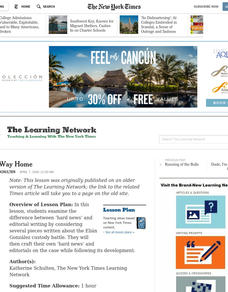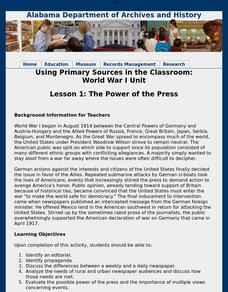The New York Times
News and News Analysis: Navigating Fact and Opinion in the Times
Help your class understand the difference between fact and opinion by exploring the New York Times homepage and articles. In pairs or small groups, pupils complete a scavenger hunt, answering the provided questions. Next, discuss the...
Curated OER
Fact and Opinion Lesson Plan
How are fact and opinion different? Middle schoolers explore fact and opinion and write articles pertaining to a football match, eliminating all opinion statements in order to focus on the facts. Then they discuss bias in the media....
Curated OER
Not Just the Facts
Encourage your learners to explore the differences between hard news and news analysis. They outline a complex news analysis about the upcoming presidential election, then endeavor to write an analysis of the same topic, using local...
Curated OER
Understanding and Using Primary and Secondary Sources in History
Explore primary and secondary sources in this historical analysis lesson. Young researchers define the terms primary source and secondary source. They read a primary source document provided by the teacher and answer questions about the...
PBS
How to Teach Your Students about Fake News
What media literacy skills do people need to evaluate a news source? Scholars listen to and discuss an NPR story about how fake headlines often dupe young people and adults alike. Next, they study news stories, using a fact-checking...
Curated OER
Writing a Personal Narrative
What is the difference between a news story and a personal narrative? This plan has learners write a personal narrative using the topic of service projects in their community. Consider completing a cross-curricular extension by bringing...
Curated OER
Integrating Quotations, Paraphrases, and Summaries Effectively
Integrating quotations, paraphrases, and summaries into a paper can be a challenge. After the terms are defined and the difference among them illustrated, viewers are shown correct and incorrect inclusions of quotations. Preview the...
Curated OER
A Long Way Home
Learners examine the difference between hard news and editorial writing by considering several pieces written about the Elian Gonzalez custody battle. They then craft their own hard news and editorials on the case.
Curated OER
An Antidote to Plagiarism
Young scholars discover how to write a research paper without directly copying written material. They read a passage, then record on the board any words that are new for them. They define these words, then organize their facts to create...
iCivics
We the Jury
Learners take on the roles of jurors in a civil case to evaluate evidence and determine a verdict in this engaging online interactive experience.
Curated OER
Student Opinion: What Teacher Do You Appreciate?
This online resource is composed of a writing sample about teacher appreciation and a writing prompt for learners. You could use this as an in-class journal activity or you could have class members post their responses on the New York...
Curated OER
What is a Metaphor?
The use of metaphors really paints a picture in the reader's mind. Get your class using metaphors in their writing by studying them first. This activity has four simple metaphors, and the reader must identify which two things are being...
Curated OER
Credible Sources on the Internet: What to Trust, What to Dismiss and When to Cite a Source
Wait, you mean researchers don't all use Wikipedia? Teach your class about intelligent research with a lesson about evaluating digital sources. The lesson starts with a quickwrite and includes vocabulary exercises and several...
Curated OER
The Screwtape Letters by C. S. Lewis (Letter 2)
In this The Screwtape Letters by C. S. Lewis worksheet, students define six key vocabulary words using only one or two words and answer seven comprehension questions from the story.
Curated OER
E-mail Abbreviations
Students identify an abbreviation or acronym for communication purposes. Students write various messages using each correctly. Students make a list of the most common abbreviation and acronyms used currently.
Curated OER
We Are One World
Young scholars access prior knowledge to choose a country and research the living conditions in that country. In this living conditions lesson, students recognize the differences and similarities of conditions of another country to ours....
Curated OER
The Power of the Press
Students identify an editorial and propaganda, discuss differences between weekly and daily newspapers, analyze needs of rural and urban newspaper audiences, and evaluate possible power of the press and importance of multiple views...
Other popular searches
- Addition and Subtraction Facts
- 100 Subtraction Facts
- Drill 100 Subtraction Facts
- Subtraction Facts to 20
- Subtraction Facts to 100
- Addition Subtraction Practice
- Math Subtraction Facts
- Basic Subtraction Drills
- Subtraction Facts 11 18
- Basic Subtraction 0 10
- Related Subtraction Facts
- Subtraction Facts to 18


















